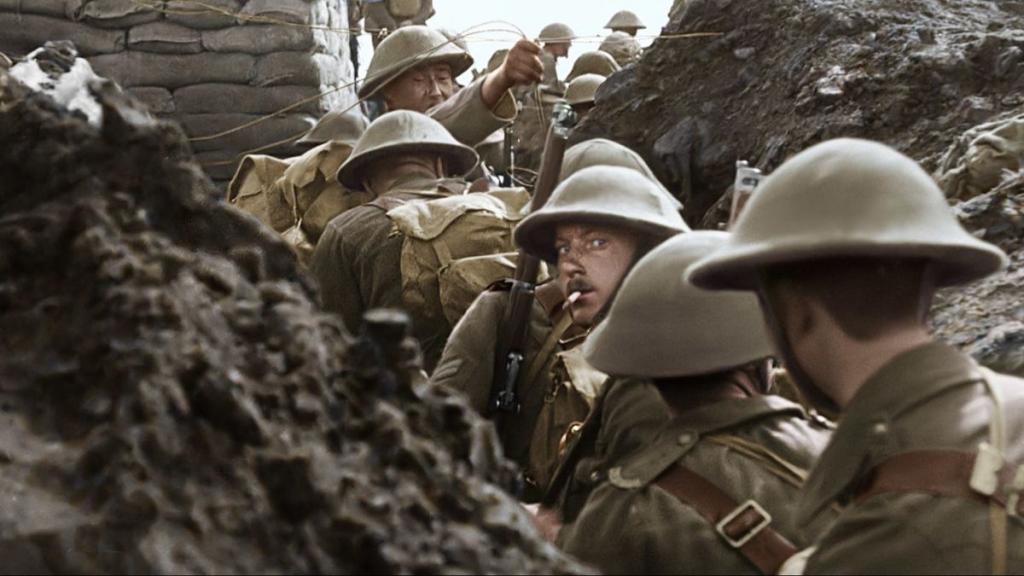
I’ve just returned home from a screening of They Shall Not Grow Old, a World War I documentary by Peter Jackson (The Lord of the Rings trilogy) that uses never-before-seen archival footage from the British Imperial War Museum. Jackson has taken the footage, sharpened and colorized it, overlain it with archival audio from British veterans of the Great War, and created a deeply moving film. As with the colorized Civil War photography we’ve seen for years, the effect is to humanize the average foot soldier, and Jackson’s editorial choices are brilliant. He lingers on shots of British soldiers resting or at play, enjoying each other and mugging it up for the camera like young people anywhere at any time. We spend long minutes in the trenches watching those same soldiers endure the psychological torture of artillery bombardment. When they stare into the camera with the forlorn bitterness of the condemned, it is heartbreaking. There are few moving pictures of actual combat, but knowing what’s to come makes scenes of Tommies “going over the top” and into the teeth of German fire especially wrenching. And subsequent footage of the damage wrought upon human bodies by shells and bullets is just sickening.
Truth is, the whole thing is sickening, and this may be Jackson’s greatest achievement. By juxtaposing youthful joie de vivre with the reality of death in the mud, he has poignantly reminded us what a colossal waste war is, especially wars of choice like World War I, which originated in a family rivalry between cousins Kaiser Wilhelm II of Germany, King George V of England, and Tsar Nicholas II of Russia. They Shall Not Grow Old can’t show us what happened to particular Tommies, but we do know that when it was all over 10 million soldiers and a numberless throng of civilians were dead, millions more were wounded, large swaths of Europe lay in ruins, Bolshevism was ascendant in Russia, and the path to an even greater bloodletting, one that would truly engulf the entire world, was paved.
Sitting there in the darkened theater, seeing for the first time the Tommies and Fritzes in the full flower of youth, I couldn’t help but reflect that nearly everyone on the screen – both German and British – was a baptized Christian, as were the princes and politicians that created such hellscapes. This was brought home in what for me is the most sickening footage, a scene where bodies are being lowered into improvised graves while an Anglican priest commits them to the ground, “in the name of our Lord Jesus Christ.” No doubt the same prayers of committal were being offered on the other side of No Man’s Land, just past the wire and the mines. I was struck by the obscenity of it all: putative disciples of Christ killing their baptized brothers, and being killed by them. “This is no place for Christians,” I said again and again in my mind. But sadly, in Leonard Cohen’s words, “the blizzard of the world has crossed the threshold and has overcome the order of the soul.” That is truer nowhere than on the battlefield, where the ontological mark of Christian baptism is the first casualty.
I’m a former US Army officer who trained for war but thankfully never saw combat. I’m also a father who watched my son march off to two combat tours in Iraq and lived to regret it. But first of all I’m a Christian. I have long wrestled in my own conscience with questions of war and peace, and while I haven’t been able to work my way to a perfect pacifism, I have no problem saying that except in the most extreme circumstances involving the defense of the innocent the battlefield is not a place for Christians. War is blasphemy, an insult to the Creator, a satanic assault on all that is good, true, and beautiful. Truly, as Pope Francis has written, “This is the fruit of war: hate, death, vendetta. Forgive us Lord.” Thank you Peter Jackson for reminding us of that once more.













